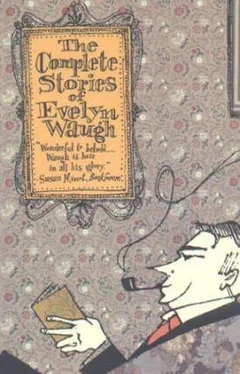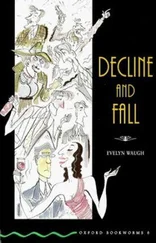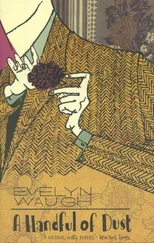Evelyn Waugh - The Complete Stories Of Evelyn Waugh
Здесь есть возможность читать онлайн «Evelyn Waugh - The Complete Stories Of Evelyn Waugh» весь текст электронной книги совершенно бесплатно (целиком полную версию без сокращений). В некоторых случаях можно слушать аудио, скачать через торрент в формате fb2 и присутствует краткое содержание. Год выпуска: 1998, ISBN: 1998, Жанр: Классическая проза, на английском языке. Описание произведения, (предисловие) а так же отзывы посетителей доступны на портале библиотеки ЛибКат.
- Название:The Complete Stories Of Evelyn Waugh
- Автор:
- Жанр:
- Год:1998
- ISBN:0-316-92546-2
- Рейтинг книги:3 / 5. Голосов: 1
-
Избранное:Добавить в избранное
- Отзывы:
-
Ваша оценка:
- 60
- 1
- 2
- 3
- 4
- 5
The Complete Stories Of Evelyn Waugh: краткое содержание, описание и аннотация
Предлагаем к чтению аннотацию, описание, краткое содержание или предисловие (зависит от того, что написал сам автор книги «The Complete Stories Of Evelyn Waugh»). Если вы не нашли необходимую информацию о книге — напишите в комментариях, мы постараемся отыскать её.
The Complete Stories Of Evelyn Waugh — читать онлайн бесплатно полную книгу (весь текст) целиком
Ниже представлен текст книги, разбитый по страницам. Система сохранения места последней прочитанной страницы, позволяет с удобством читать онлайн бесплатно книгу «The Complete Stories Of Evelyn Waugh», без необходимости каждый раз заново искать на чём Вы остановились. Поставьте закладку, и сможете в любой момент перейти на страницу, на которой закончили чтение.
Интервал:
Закладка:
It was clearly not the job for which his age and education should have fitted him. Later I learned the explanation.
He had gone into business on leaving his public school, had done quite well, and eventually, just before the war, had set up on his own with the capital left him at his father’s death.
“I had bad luck there,” he said. “I never feel quite to blame over what happened. You see, I’d taken a chap into partnership with me. He’d been a clerk with me in the office, and I’d always liked him, though he didn’t get on very well with the other fellows.
“He got sacked just about the time I came in for some money. I never quite made out what the trouble was about, and anyway it was none of my business. The arrangement seemed rather lucky at first, because my partner wasn’t fit for military service, so all the time I was in the army he was able to look after things at home.
“The business seemed to be going very well, too. We moved to new offices and took on a larger staff, and all through the war we were drawing very decent dividends. But apparently it was only temporary prosperity.
“When I got back after the Armistice I didn’t pay a great deal of attention to my affairs, I’m afraid. I was glad to be home and wanted to make the most of peace. I left my partner to manage everything, and I suppose I more or less let things slide for two years.
“Anyway, I didn’t know how bad things were until he suddenly told me that we should have to go into liquidation.
“Since then I’ve been lucky in getting jobs, but it isn’t quite the same as being one’s own master.”
He gazed out across the quay, turning his glass idly in his hand. Then, as an afterthought, he made an illuminating addition to his story.
“One thing I’m very glad of,” he said, “my partner didn’t come down with me. Almost immediately after we closed down he opened on his own in the same way of business on quite a large scale. He’s a rich man now.”
Later in the day he surprised me by casually mentioning his son.
“Son?”
“Yes. I’ve a boy of twenty-seven at home. Awfully nice fellow. I wish I could get back more often to see him. But he’s got his own friends now and I dare say he’s happy by himself. He’s interested in the theatre.
“It’s not a thing I know much about myself. All his friends are theatrical, you know, jolly interesting.
“I’m glad the boy has struck out for himself. I always made a point of never trying to force his interest in anything that didn’t attract him.
“The only pity is that there’s very little money in it. He’s always hoping to get a job either on the stage or the cinema, but it’s difficult if you don’t know the right people, he says, and that’s expensive.
“I send him as much as I can, but he has to be well dressed, you know, and go about a good deal and entertain, and all that takes money. Still, I expect it’ll lead to something in the end. He’s a jolly good fellow.”
But it was not until some days later, on board ship, when we were already berthed at the port where he was due to disembark next day, that he mentioned his wife.
We had had many drinks to wish each other good luck on our respective journeys. The prospect of immediate separation made mutual confidence easier than it would be between constant companions.
“My wife left me,” he said simply. “It was a great surprise. I can’t to this day think why. I always encouraged her to do just what she wanted.
“You see, I’d seen a lot of the Victorian idea of marriage, where a wife was supposed to have no interests outside her housekeeping, and the father of the family dined at home every evening. I don’t approve of that.
“I always liked my wife to have her own friends and have them in the house when she wanted and to go out when she wanted and I did the same. I thought we were ideally happy.
“She liked dancing and I didn’t, so when a chap turned up who she seemed to like going about with, I was delighted. I’d met him once or twice and heard that he ran after women a good bit, but that wasn’t my business.
“My father used to keep a strict division among his friends, between those he saw at home and those he met in the club. He wouldn’t bring anyone to his house whose moral character he didn’t wholly approve of. I think that’s all old-fashioned rot.
“Anyway, to cut a long story short, after she’d been going out with this fellow for some time she suddenly fell in love and went off with him. I’d always liked him, too. Jolly good sort of fellow. I suppose she had a perfect right to do what she preferred. All the same, I was surprised. And I’ve been lonely since.”
At this moment two fellow passengers whose acquaintance I had been scrupulously avoiding came past our table. He called them to our table, so I wished him “Good-night” and went below.
I did not see him to speak to next day, but I caught a brief glimpse of him on the pier, supervising the loading of his crate of sample sewing machines.
As I watched, he finished his business and strode off towards the town—a jaunty, tragic little figure, cheated out of his patrimony by his partner, battened on by an obviously worthless son, deserted by his wife, an irrepressible, bewildered figure striding off under his bobbing topee, cheerfully butting his way into a whole continent of rapacious and ruthless jolly good fellows.
EXCURSION IN REALITY
I
The commissionaire at Espinoza’s restaurant seems to maintain under his particular authority all the most decrepit taxicabs in London. He is a commanding man; across his great chest the student of military medals may construe a tale of heroism and experience; Boer farms sink to ashes, fanatical Fuzzi-wuzzies hurl themselves to paradise, supercilious mandarins survey the smashing of their porcelain and rending of fine silk, in that triple row of decorations. He has only to run from the steps of Espinoza’s to call to your service a vehicle as crazy as all the enemies of the King-Emperor.
Half-a-crown into the white cotton glove, because Simon Lent was too tired to ask for change. He and Sylvia huddled into the darkness on broken springs, between draughty windows. It had been an unsatisfactory evening. They had sat over their table until two because it was an extension night. Sylvia would not drink anything because Simon had said he was broke. So they sat for five or six hours, sometimes silent, sometimes bickering, sometimes exchanging listless greetings with the passing couples. Simon dropped Sylvia at her door; a kiss, clumsily offered, coldly accepted; then back to the attic flat, over a sleepless garage, for which Simon paid six guineas a week.
Outside his door they were sluicing a limousine. He squeezed round it and climbed the narrow stairs, that had once echoed to the whistling of ostlers, stamping down to stables before dawn. (Woe to young men in Mewses! Oh woe, to bachelors half in love, living on £800 a year!) There was a small heap of letters on his dressing table, which had arrived that evening while he was dressing. He lit his gas fire and began to open them. Tailor’s bill £56, hosier £43; a reminder that his club subscription for that year had not yet been paid; his account from Espinoza’s with a note informing him that the terms were strict, net cash monthly, and that no further credit would be extended to him; it “appeared from the books” of his bank that his last cheque overdrew his account £10 16s. beyond the limit of his guaranteed overdraft; a demand from the income-tax collector for particulars of his employees and their wages (Mrs. Shaw, who came in to make his bed and orange juice for 4s. 6d. a day); small bills for books, spectacles, cigars, hair lotion and Sylvia’s last four birthday presents. (Woe to shops that serve young men in Mewses!)
Читать дальшеИнтервал:
Закладка:
Похожие книги на «The Complete Stories Of Evelyn Waugh»
Представляем Вашему вниманию похожие книги на «The Complete Stories Of Evelyn Waugh» списком для выбора. Мы отобрали схожую по названию и смыслу литературу в надежде предоставить читателям больше вариантов отыскать новые, интересные, ещё непрочитанные произведения.
Обсуждение, отзывы о книге «The Complete Stories Of Evelyn Waugh» и просто собственные мнения читателей. Оставьте ваши комментарии, напишите, что Вы думаете о произведении, его смысле или главных героях. Укажите что конкретно понравилось, а что нет, и почему Вы так считаете.












